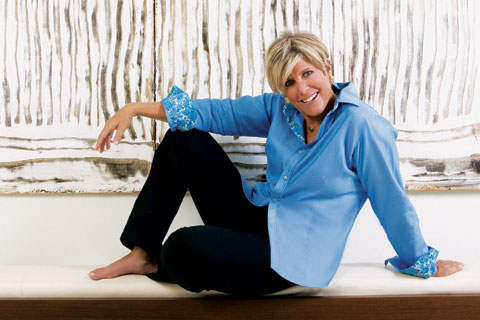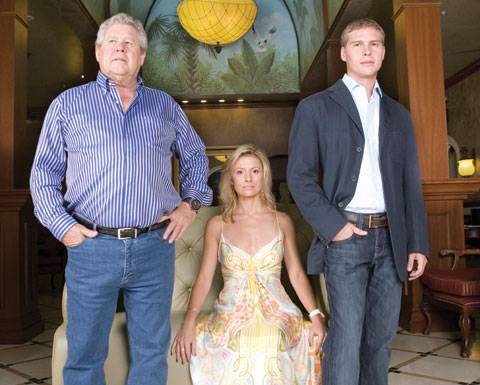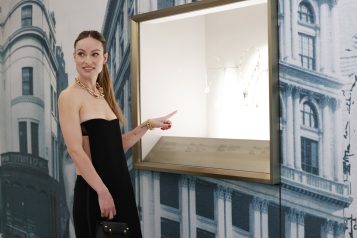
Suze Orman, personal finance expert extraordinaire, strolls casually into the living room of her condominium in Hillsborough Beach, a small town located mere miles up the Florida coast from Ft. Lauderdale. Orman is barefoot, wearing a button down in a striking blue color, no doubt selected to bring out the matching hues in her eyes. She smiles, her face lights up, and so does everyone else’s in the room. The woman is magnetic, giving off a constant energy that people respond to, both onscreen and off.
She sits on her couch, leaning back, taking a deep breath and admiring the views of the Atlantic Ocean lapping at the sand just beyond her window. Orman’s condo is sparsely and thoughtfully decorated, with nary a detail not planned out. The white palette is shot through with some earth tones, but in all, the home is subdued and filled with nothing more than Orman and her partner, Kathy “KT” Travis, need, despite the ability to afford anything their hearts desire. It is because Orman practices what she preaches: “The more you have around you, the more you spend to fill it up. The less you have around you, the less you buy that you don’t need.” This philosophy, which is infused into all eight of her bestselling books, preached weekly from The Suze Orman Show, and written in her columns for O, The Oprah Magazine and Yahoo! Finance, stems from her past, which taught her to live with passion, hope, and an unwavering desire to do well.
Young, Fabulous & Broke
Her story begins in Chicago where she was a poor student with little ambition to succeed. After a stint at University of Illinois at Champaign-Urbana, Orman went out to discover America in a Ford Econoline van, driving cross-country until she found herself in Berkeley, California. She went to work as a waitress at the Buttercup Bakery, raking in a whopping total of $400 per month. After seven long years, Orman realized she had bigger dreams, and asked her not-so-well-off parents for a $20,000 loan, an amount far larger than they could even dream of providing. Orman explains, “The next day at work, a man I had been waiting on for seven years, Fred Hasbrook, noticed that I wasn’t my usual cheerful self. ‘What’s wrong sunshine? You don’t look happy,’ he asked.” Orman explained about asking her parents for the money, and Hasbrook immediately jumped into action. After talking to some of the other regular customers in the café, he presented Orman with a handful of napkins wrapped around checks from a multitude of customers from the bakery, totaling a $50,000 donation for the struggling waitress. It was given to her with a note that said, “This is for people like you, so that your dreams can come true. To be paid back in ten years, if you can, with no interest.”
Women & Money
She manages to make her hectic schedule look easy, especially from the comfort of her Florida home, which she says is where she feels most relaxed.
Determined to make the most of her newfound funds, Orman headed to Merrill Lynch on the advice of Hasbrook, where a shady broker had Orman sign on the dotted line of a blank document, which he made to look like she was interested in a high-risk investment in stocks and options. Her money was squandered, leaving Orman penniless after only months. During this process, she had learned to follow her options and stocks closely. “I watched Wall Street Week on PBS every Friday night, I read Barron’s and the Wall Street Journal. I taped the pages with the stock and option prices to my bedroom walls,” she explains. Desperate after he lost her money, she thought, “I can be a broker-they just make you broke-er!” So she began studying, eventually winding up interviewing for a job at Merrill Lynch. Her opinion is that she was hired “because there was a women’s quota to fill.” In fact, during the interview, the branch manager shared his belief that women belonged barefoot and pregnant. “Seeing that I had nothing to lose, I asked him how much he’d pay me to get pregnant.
He said, ‘Fifteen hundred dollars a month,’ and to my astonishment, he hired me,” says Orman.
While learning the financial business, she came to realize that her shady broker had broken all the rules of personal finance. She wound up suing Merrill Lynch for the money she had invested. Being an ethical company, Merrill Lynch paid Orman back, plus interest. She in turn paid back all of the people who had believed in her enough to give her a chance to succeed. With her new job at Merrill Lynch, she no longer needed their loans-she was going to make it on her own.
The Road to Wealth
Orman’s rise to the top of her industry stems from her days at Merrill Lynch during the mid-1980s and then as VP of Prudential Bache, where she advised on highly complicated tax-free insurance policies and became the nation’s expert on one particular investment. While listening to the radio one day, she heard a financial advisor giving the wrong information about the investment. Orman jumped into action, writing a letter to the host of the show. She was asked to appear on the radio in the following weeks giving the right information, and the media ball has been rolling steadily ever since, building momentum along the way.
Today, Orman is the most successful personal financial advisor in the entire industry, and undoubtedly the most recognizable. She has appeared virtually everywhere; in addition to The Suze Orman Show on CNBC (which airs every Saturday night), she has been a regular on The Oprah Winfrey Show, The Today Show, The View, and Larry King Live. This doesn’t even mention her PBS specials and her stints on QVC.
She manages to make her hectic schedule look easy, especially from the comfort of her Florida home, which she says is where she feels most relaxed. More than once during our conversation about her successes, she says, “I just didn’t get it.” It’s hard to believe her though-the blonde hair and baby blue eyes may have fooled a person or two over the years, but I have no doubt that Orman knew what she was doing all along, although to this day she swears it just came naturally.
Her first book, You’ve Earned It, Don’t Lose It: Mistakes You Can’t Afford to Make When You Retire was published in the early ’90s, albeit against much resistance from the industry. “No publisher wanted to do a book on finances from a woman,” Orman explains. Finally, New Market Press agreed to pay $10,000 for the book, which took Orman a year and a half to write. After publication, a book tour ensued, and it didn’t take long for people to realize Orman’s oratory skills were exceptional. Whether she is giving a speech to a crowd of 30,000, teaching a class to 50, or on the airwaves reaching millions, she has a way of relating to every member of the audience. During her book tours, she manages to pack the house. After writing her first book, it wasn’t long before she was in front of the camera talking finances on QVC. Again she says, “I wasn’t nervous, because I just didn’t get it. I was just talking about my book!” but her relaxed nonchalance made people sit up and take note of her advice. She topped every sales record that QVC had for books to date. In fact, when she went on the air at halftime of the Super Bowl in 1996, for the first time in history, QVC actually had to ask their customers to hang up the phones-the lines were literally being burned down by people trying to get their hands on the financial advice Orman was dolling out.
So obviously it wasn’t long before she was commissioned to write another book, this one titled The 9 Steps to Financial Freedom, which went on to become the number one bestselling hardback nonfiction book of 1998, with more than 3 million copies sold. It was an ironic choice for title, seeing as Orman originally agreed to pen the book for only $20,000. A friend managed to convince her that she, too, like many of the people she was writing about, had in fact “earned it.” She allowed a bidding war to start for her book, and received $800,000 for her two follow-ups.
These nine steps landed Orman an hour on QVC, which propelled her to host a PBS special where she went on to become the single most successful fundraiser in all of PBS history. In fact, she recently was honored with her second Daytime Emmy Award in the category of Outstanding Service Show Host. Her current PBS special, aptly titled Women & Money after her latest bestselling book, began airing in March 2007.
The Courage to Be Rich
Today, Orman’s life is spread out across the country, as she splits her time between her homes in Florida, New York, and California. But as she attests, “Where I spend most of my time is in my plane!” And that really is her top indulgence because Orman practices what she preaches: “I always tell people to ask themselves, ‘When do you buy what you need versus what you can afford, and when can you afford more than what you need?'” She explains, “A long, long time ago, I decided I would never buy anything more than I needed.” When she first hit the financial jackpot and was looking to buy in the city because she was spending a lot of time appearing on the Today Show, instead of buying a Park Avenue penthouse-which she could have afforded-she opted for a 990-square-foot place on Madison Avenue for $240,000. She still owns that apartment, and is only moving out to join the ranks at a more prestigious building where she didn’t opt for a Park view, because “Why would I want to spend another three or four million dollars for an apartment I am in maybe two months a year?”
The style in all of her homes is modern and minimalist, reflecting her motto once again: never more than you need. She also says with a laugh, “I like my homes to remind me of hotels, because I spend so much time in hotels, I feel more comfortable in that style of surroundings.”
Now that she has achieved untold levels of success, she is spreading the wealth that was given to her when she was in her twenties by the customers at the Buttercup Bakery, helping people both here and abroad. During a recent trip to South Africa, Orman gave funds to a mission that helps children orphaned by AIDS. In addition, she is building a development in Johannesburg, and has been honored for her philanthropic work here in the States, but she hasn’t let the success go to her head. She still shells out financial advice to anyone who asks. Her main recommendation? Protect your tomorrows today!
“Every single one of [Haute Living readers], I don’t care how rich or how poor, needs estate planning, and needs a place for their money to live, a place as equally nice as the homes where they live. If you have a high net-worth and are married, you need a tax-planning trust. You need to make sure that you have given your bills, bucks, and pennies-your financial children-a secure and good place to live so that you can make the most out of what you have. You need to make sure your money is parked in the right type of house to pass it down to those you love, or you’re going to be losing far more than you need to. In 2011, the most people can leave to the people they love (other than their spouse) is one million dollars. So for Haute Living readers, if you are high-end you had better seriously get your financial house in order.” Based on Orman’s flawless track record, we suggest you take heed of her priceless financial advice.




















